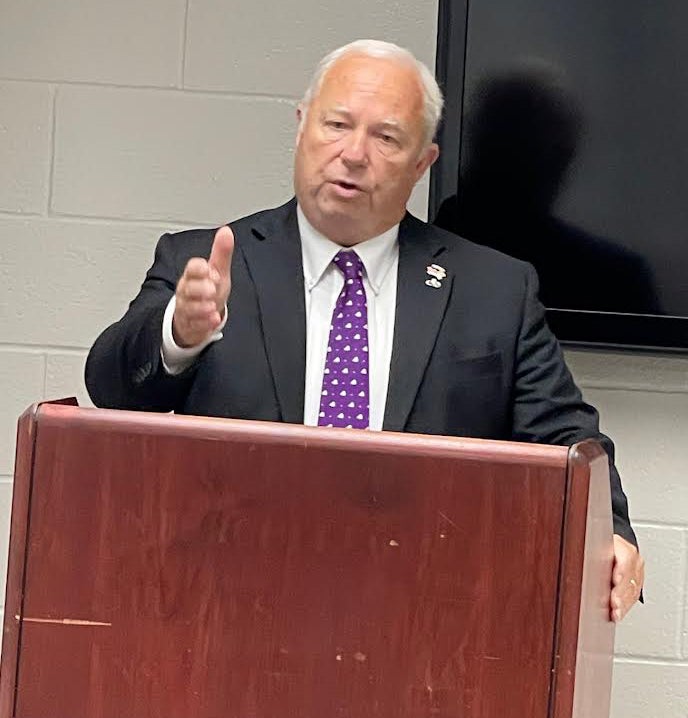Collaboration will help those in need and local employers
Published 8:29 am Wednesday, October 26, 2022

- Boyle County Judge-Executive Howard Hunt speaks at the second-chance program. Photo submitted
STAFF REPORT
In the United States, there are approximately 11.3 million jobs open, and fewer than 6 million unemployed workers, leaving a gap of 5.3 million unfilled positions. In Boyle County alone, there are 1,500 open jobs with little work force to fill these positions.
To help fill that void, the Boyle County Detention Center, Boyle County Fiscal Court and Shepherd’s House are partnering with Bluegrass Community and Technical College to provide men and women who are enrolled in the Shepherd’s House program the opportunity to participate in a program that pairs individuals with local employers.
“Forging this new partnership will afford these persons a chance to obtain job skills and certificates that enhance their employability, subsequently increasing their chances at maintaining long-term sobriety,” said Brian Wofford, Boyle County Jailer.
Founded in 1984 in Lexington, Shepherd’s House provides a structured environment enabling clients to develop community, financial and employment skills necessary to lead a fulfilled and sober life.
“This partnership between Boyle and Mercer Counties Joint Jail Committee and BCDC provides treatment services to men and women who have involvement in the criminal justice system or individuals who may currently be incarcerated in BCDC,” said Jarrod Thomas of Shepherd’s House. “Working with Jailer Wofford, Judge Howard Hunt, Dr. Erin Tipton and James Neyhouse this new program will provide higher education and employment opportunities to the men and women served in the Shepherd’s House program.”
The program not only can help local employers fill much needed voids in their operations, but it will have a positive impact on the community, as well.
“I believe in second chances,” said Boyle County Judge-Executive Howard Hunt. “We have to address the gap in employment numbers and this new program will give those I would classify as non-violent offenders a chance to become productive, contributing members of the community. We have, for too long, attached a stigma to persons who have battled addiction or those who have been incarcerated. Many of these persons who battle addiction simply need a second chance.”
According to a paper issued by the U.S. Chamber of Commerce entitled The Business Case for Criminal Justice Reform: Second Chance Hiring, formerly incarcerated persons are unemployed at a rate of 27%.
The stigmas attached to a criminal record are important to acknowledge. This includes labeling, stereotyping, status loss and discrimination that accompanies a criminal record. These stigmas manifest as a lack of trust that makes some employers reluctant to hire ex-offenders, the report says.
“The lack of education and employment are also barriers to entry back in to the workforce,” Hunt said. “Most formerly incarcerated persons have less work experience and fewer job related skills than the general population. This partnership with BCTC will help alleviate the disparity by giving Central Kentuckians a chance to learn a skill, increase their ‘hire-ability’ to become contributing members of the local economy.”





